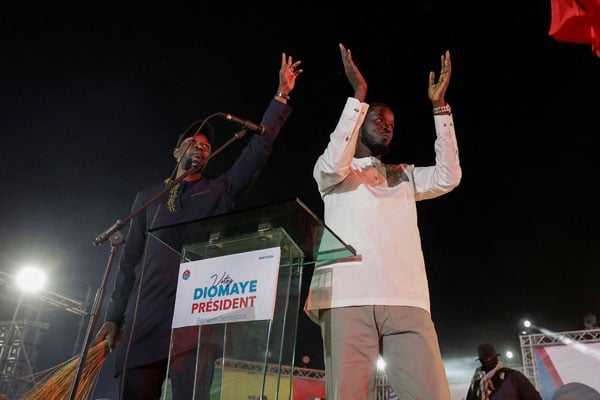Prime
One president, two first ladies: The case of Senegal

Senegal's president-elect Bassirou Diomaye Faye speaks during a press conference in Dakar, Senegal March 25, 2024. PHOTO/REUTERS
What you need to know:
- Mr Faye defeated the former prime minister, Mr Amadou Ba, who had Mr Sall’s backing.
One President, two first ladies. That is the dawning reality in Senegal today because a polygamous man, Bassirou Diomaye Faye, is the country’s president-elect after Sunday’s elections.
He joins a tiny league of African presidents who have had more than one official wife.
However, we are not likely to hear “I only have one wife” (or the more probable French version “Je n’ai qu’une épouse”) like it once happened in Kenya’s top seat because Mr Faye is a Muslim.
Safe to say, Senegal can have as many as four first ladies.
Kenya’s President, William Ruto, earned a nickname alluding to Zacchaeus (known as Zakayo in Kiswahili), the tax collector in the Bible, due to the tax policies he introduced when he took over power in late 2022.
Mr Faye, on the other hand, used to be a government tax inspector before he took a full plunge into the country’s politics.
The French version of Zacchaeus is Zachée.
Whether Mr Faye, who studied law up to Master’s level, will evoke memories of Zachée in the policies he introduces in the western African country is a matter of wait-and-see.
Mr Faye’s win has captured the attention of many Kenyans for many reasons.
Among them is the fact that he literally walked from prison to the country’s seat of power.
“He ran a successful presidential campaign in just 10 days after leaving prison,” journalist Larry Madowo tweeted.
Another reason is that he is only 44. In fact, he turned 44 on Monday, when it was becoming clearer that he was clinching the top seat as some of his 15 opponents conceded defeat and congratulated him.
“Senegal has shown us that it’s possible by electing a youthful person as the president,” tweeted Embakasi East MP Babu Owino on Tuesday. “Next is Kenya.”
Politician Jimmy Wanjigi posted: “Your victory is a testament to the hopes and aspirations of young people in Senegal and beyond.”
Lawyer Miguna Miguna was also moved by the fact that Mr Faye, a relatively unknown figure, managed to trounce the machinery run by outgoing President Macky Sall.
Mr Faye defeated the former prime minister, Mr Amadou Ba, who had Mr Sall’s backing.
“(Mr Faye) has smashed a well-oiled propaganda/disinformation [campaign] about African elections — that only the wealthy, western-backed, entrenched families and deep state are capable of counting the votes, declaring themselves elected and installing themselves as presidents or prime ministers,” Mr Miguna wrote on X.
Former Kenya Medical Practitioners and Dentist Union Secretary-General Ouma Oluga, who was once jailed due to trade union activities, could not resist a chance to take a swipe at those trying to associate with Mr Faye’s change of fortunes from prison to the palace.
“Politicians who’ve never stood for anything let alone thinking about prison associating with ‘revolutionary change’ in Senegal,” he posted on X, magnifying the sarcasm by posting a sloth’s claws to accompany the words.
Mr Faye also helped form a labour union for tax workers in his earlier days.
The fact that Senegal will have two first ladies was also not lost on some Kenyan observers, and a video of Mr Faye introducing both his wives to an audience gained currency on social media platforms.
However, some African presidents before Mr Faye led their countries while openly polygamous, among them Mr Jacob Zuma, South Africa’s President between 2009 and 2018.
Former presidents Omar al Bashir (Sudan), Idi Amin (Uganda), Mobutu Sese Seko (Zaire), Gnassingbe Eyadema (Togo), among others, were also in the league of the polygamous.
Mr Faye had been thrown in jail following his arrest on various charges that, according to Doha, Qatar-based news 24-hour channel Al-Jazeera, included provoking insurrection, conspiring with ‘terrorist’ groups, endangering State security and immoral behaviour towards individuals younger than 21.
Also jailed was Mr Faye’s opposition ally Ousmane Sonko.
Their detention caused scenes all over Senegal as citizens, wary that President Sall would be tempted to go for an illegal third term, protested violently.
Both Mr Faye and Mr Sonko were released on March 14, just days before the election.
Had Mr Sonko not have been barred from running due to a conviction on the charge of defamation, he would have contested the presidency. He, however, endorsed Mr Faye.
Mr Faye and Mr Sonko both studied law and worked as tax inspectors. They are known to have spoken out against corruption when they held that role.
Alioune Tine, founder of the AfrikaJom Centre think-tank, told the Associated Press that the two “are seen as ‘incorruptible’ tax inspectors who did not fill their pockets while others did”.
Mr Faye’s election is being hailed as a loud statement by Senegal’s youth.
With an estimated population of 17 million, Reuters reports that 60 per cent of Senegal’s population is younger than 25.
History books are also set for a rewrite as Mr Faye has set his sights on the CFA franc, a currency backed by the French treasury and which was inherited from the colonial times and is accepted by 14 countries.
In his pledge of getting rid of the CFA franc, it will mean a reset of west African economies.
Added to his pledge to renegotiate mining and hydrocarbon contracts, Senegalese voters appeared to have had one word for him — touché!
*Written by Elvis Ondieki



